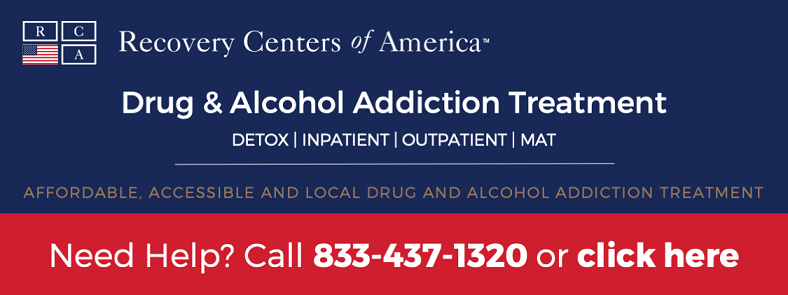
Stock image.
Promoted Content: From time to time, CVN will highlight services our partners provide that we believe are of interest to our readers.
In the wake of statistics showing widespread substance use and abuse within the legal profession, law firms nationwide have launched wellness initiatives to address the problem. But a leading addiction expert urges firms to take a more comprehensive approach to the issue.
"If a wellness officer is going to explore whether a person has a substance use problem, they absolutely have to make sure that it's confidential to decrease stigma, that its done by someone with knowledge in this area, and finally, that they have an array of possible services to offer to address all levels of problems," Dr. Deni Carise, a national addiction expert and Chief Scientific Officer of Recovery Centers of America, told CVN.
Confidentiality and Support Within the Wellness Office
Indeed, statistics show confidentiality concerns play a key role in untreated substance abuse among attorneys. A study published in 2016 by the Journal of Addiction Medicine showed more than 20% of attorneys were considered "problem" or "dangerous" drinkers. However, less than 10 percent of the ABA-commissioned study’s respondents actually sought help, with many saying they worried about being discovered.
Carise said a full slate of wellness offerings, such as exercise and nutrition counseling, is one important way, along with more traditional privacy protocols, to ensure that attorneys concerned about their substance use aren’t outed simply by visiting the firm’s wellness director. "That way," Carise said, "when somebody goes to the wellness office, it’s not assumed 'Oh, they must be using drugs or struggling with a mental illness.'"
And just as importantly, Carise said, those other offerings address stressors often associated with substance use disorder. But Carise said recommendations should be tailored to attorneys’ unique needs and personalities. "There are a lot of really well-intentioned wellness professionals out there who will recommend that everyone meditate half an hour a day or do a lot of affirmations," Carise said. "That may not work for really driven, hard-hitting attorneys. You may have to start with smaller things and add wellness recommendations little by little."
Those initiatives not only lay the groundwork for overall employee well-being, they build the type of trust attorneys need when seeking help with a substance use issue. Carise added that wellness departments can be crucial to an attorney struggling with drugs or alcohol. "Science shows that family and employer involvement are two of the best predictors about whether someone will enter into and complete a full course of treatment," she said.
An "Action Moment" That Leads to Treatment
Because employer involvement is so important, RCA treatment advocates work with law firm wellness programs, legal groups, and other associations on recognizing and addressing signs of potential substance use disorder.
But Carise said attorneys can be reluctant to admit they need help. It's one reason she says wellness personnel should take advantage of the moment when attorneys reach out, and encourage them to call a counselor to help them evaluate their concerns immediately.
"Addiction, like other chronic illnesses, particularly in its early forms, has moments of remission and exacerbation," Carise said. When an attorney mentions concerns about their drug or alcohol use to a firm's wellness officer, it's an opportune moment to take action and suggest calling someone who specializes in substance use disorder assessment and treatment.
The importance of immediately responding to a request for help is one reason RCA offers around-the-clock staff who can answer questions, talk with family, and even check insurance and schedule admissions immediately, a rarity in the field. Trained counselors are always available to speak with attorneys about their substance use, answer questions, and recommend types of treatment. RCA has multiple modalities and levels of care at their sites across Maryland, Massachusetts, New Jersey, Pennsylvania and, in the next year,Texas, Illinois, and Indiana.
RCA’s treatment program is based on decades of research and tailored to each patient's needs. It may include medical detoxification and residential in-patient care before transitioning to outpatient treatment and follow-up. Medication-Assisted-Treatment (MAT) is also offered at inpatient and outpatient levels, as well as at standalone MAT clinics.
Attorneys may stay in residential wings that help protect their privacy during treatment, while they spend full days in activities and therapy sessions designed to address both their substance use disorder and the issues that may have led to substance use.
And RCA’s local treatment model allows for family and employer involvement, based on their preferences, throughout an inpatient stay, as well as seamless, discreet outpatient follow-up after an attorney returns to work. "If somebody is in treatment locally, they can get well, their family can be involved, and then they can continue their care where they know people," Carise said. "They don’t face break points that occur when someone flies away for treatment, then flies back home and has to start all over with outpatient care."
That continuing care also includes alumni groups that are particularly important for attorneys who need support beyond their circle of colleagues, Carise told CVN. "Creating a social bond with other people in recovery doesn’t just help. It’s really essential," she said.
A Partner in Wellness
Importantly, Carise noted that because attorneys may be reluctant to seek help, colleagues or family members are often the first to express a concern about possible substance abuse. RCA experts are available 24 hours a day to discuss these concerns anonymously, then discreetly and professionally follow up with the attorney directly.
And when needed, RCA professionals are trained in leading tailored, effective interventions that can set the stage for recovery. "That can be anything from a conversation with the interventionist on the phone to the interventionist actually meeting one-to-one, talking to the person, and getting them into treatment," Carise said.
"We want to remove any of the barriers to coming into treatment, so there is the highest likelihood that every individual will get well," Carise added.
"It's never too late to get well, and millions of people do recover."
Learn more about Recovery Centers of America.
If you or a colleague may be struggling with substance use, call
833-437-1320.





